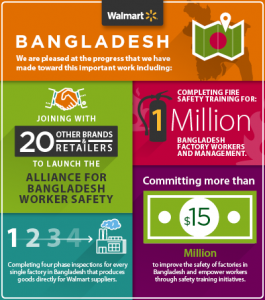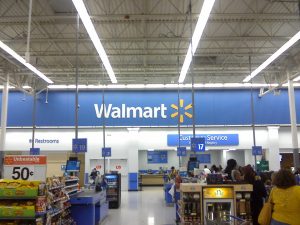 In recent years, Walmart has been making an effort to tighten standards for ethical sourcing for products. Until recently, it was not uncommon for U.S. suppliers to have only a vague idea of just where their products were sourced. Subcontracting was common, so the people a supplier worked with were often several steps away from the people working in the factory that made the products.
In recent years, Walmart has been making an effort to tighten standards for ethical sourcing for products. Until recently, it was not uncommon for U.S. suppliers to have only a vague idea of just where their products were sourced. Subcontracting was common, so the people a supplier worked with were often several steps away from the people working in the factory that made the products.
Walmart’s current Supplier Standards set out requirements for safety and well being in factories, include zero tolerance for unauthorized subcontracting, and lay out stringent rules regarding payment. Walmart also provides posters in multiple languages detailing the standards and encouraging workers to call to report problems.
Walmart also has set up a program of audits by third party auditing firms with consequences for failing to demonstrate adherence to the standards. Factories that fail to meet the standards repeatedly or which present an immediate danger to workers are placed on an “unapproved” list and cannot produce goods for sale in Walmart.
In Bangladesh, where (among other factory tragedies) an 8-story factory building collapsed a year ago, killing more than 1200 workers, the standards are stricter. Walmart is also joining with other retailers to supply additional support to workers and factory owners to try to improve conditions in the factories.
This is not the happy ending of the story, though. The reports on progress in Bangladeshi factories are not optimistic.
A report from Businessweek expressed concern that Walmart audits were not as transparent as they could have been — not, in fact, transparent enough to let workers know whether their factories were deadly or not. A documentary described by The Guardian details problems that may not even show up in an audit, including not only child labor but also physical and verbal abuse of child workers by factory supervisors. A floor manager would not hit a worker with a bolt of fabric in front of Walmart auditors.
Nonetheless, Walmart has published a list of unapproved factories in Bangladesh. From Aero Design to Zisa Fashion Ltd., these are the companies that cannot be used by suppliers to produce goods for Walmart.
The list is helpful. Without it, it could be hard for U.S. suppliers to determine which factories provide decent jobs and which put their workers in danger. One of the factories on the list, Z. M. Apparels, specifically claims on their website to be concerned about the safety of their workers. Their lengthy list of the special perks provided for their workers, which include soap and a towel in each toilet, is so far from U.S. ideas about working conditions that it is hard for an American supplier to judge whether this is in fact a safe and healthy workplace or not. Most of the factories do not have websites, and suppliers must try to gauge the fitness of the factory from bills or lading or client lists (Adidas figures on the lists of both Aero Designs and Zisa Fashion, for example) provided on business information sites. Even buyers who visit a factory may not be given accurate information.Walmart’s list may not only help suppliers avoid the worst offenders, but may also show the remaining factories that Walmart is serious, and provide impetus to improve working conditions.



